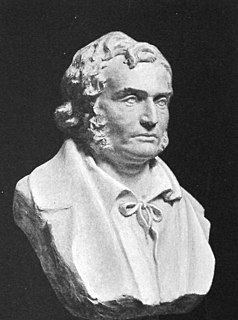
Johan Nicolai Madvig, was a Danish philologist and Kultus Minister.

Poul Martin Møller was a Danish academic, writer, and poet. During his lifetime, he gained renown in Denmark for his poetry. After his death, his posthumously published fiction and philosophical writings were well received. He also devoted several decades of study to classical languages and literature. While serving as a professor at the University of Copenhagen, he was a mentor to the philosopher Søren Kierkegaard.

Frederiksberg Kommune is a municipality on the island of Zealand (Sjælland) in Denmark. Part of Copenhagen, it is surrounded by Copenhagen Municipality. The municipality, co-extensive with its seat, covers a total area of 8.71 km2 according to the Municipal Key Figures and has a population of 105,037 making it the smallest municipality in Denmark area-wise, the fifth most populous, and the most densely populated. Its mayor is Jørgen Glenthøj from the Conservative People's Party.

The Danish Defence Intelligence Service (DDIS), is a Danish intelligence agency, responsible for Denmark’s foreign intelligence, as well as being the Danish military intelligence service. DDIS is a department under the Ministry of Defence and works under the responsibility of the Defence Minister of Denmark. It is housed at Kastellet in Copenhagen.
Folketing elections were held in Denmark on 9 April 1895.

The Danish Folketing election of 1915 was held on 7 May 1915. As required to change the Constitution, the government called for the dissolution of both the Folketing and the Landsting in order for the new Rigsdag to be able to introduce the new constitution. However, as this was during World War I, no campaigning took place, and the election was settled without voting in 104 of 114 constituencies. Therefore, it is impossible to give numbers for the actual support the respective parties received from the voters.

Folketing elections were held in Denmark on 26 April 1920, except in the Faroe Islands, where they were held on 20 May. The election campaign was the most aggressive and bitter in Denmark in the 20th century. Voter turnout was 80.6% in Denmark proper and 58.8% in the Faroe Islands.
The first Danish Landsting election of 1920 was held on 10 August 1920, with the exceptions that the seats elected by the resigning parliament were elected on 26 June, the Faroese member was elected on 23 August, and the electors that elected the candidates standing in the constituencies were elected on 30 July.
The second Danish Landsting election of 1920 was held on 1 October 1920, with the exceptions that the seats elected by the resigning parliament were elected on 10 September, except for the representative of South Jutland County who was elected on October 7, the Faroese member was elected on 3 February 1921, and the electors that elected the candidates standing in the constituencies were elected on 24 September 1920.
Folketing elections were held in Denmark on 20 April 1892.
In the Danish Folketing election of 1890, which was held on 21 January 1890, the approximate total votes and the actual seats won were:
In the Danish Folketing election of 1884, which was held on 25 June 1884, the approximate total votes and the actual seats won were:
The Danish Landsting election of 1924 was held on 23 September 1924, with the exception that the electors were elected on 18 September.
The Danish Landsting election of 1928 was held on 21 September 1928, with the exceptions that the electors were elected on 14 September, that the candidates elected by the resigning parliament were elected on 15 August, and that the Faroese candidate was elected on 23 August.
The Danish Landsting election of 1932 was held on 13 September 1932, with the exception that the electors were elected on 5 September.
The Society of the Friends of Peasants was a liberal Danish political society founded on 5 May 1846 by members of the provincial consultative assemblies Johan Christian Drewsen and Balthasar Christensen with the intent to promote the liberation of the peasantry and equality among the different classes of society. Among its most politically influential members were Anton Frederik Tscherning, Jens Andersen Hansen and Carl Christian Alberti.
The Danish Landsting election of 1943 was held on 6 April 1943, with the exception that the electors were elected on 23 March. Along with the corresponding Folketing election, it was the first election during the German occupation, and although many people feared how the Germans might react to the election, the event took place peacefully.
The Danish Landsting election of 1947 was held on 11 April 1947, with the exceptions that the electors were elected on 1 April 1947, that the candidates elected by the resigning parliament were elected on 7 March, and that the Faroese member was elected on 26 March.

SS Laura was an 1875-built steamship owned by Peter Mærsk-Møller. Originally built as the Roll Call by J Readhead & Co in South Shields, she was renamed Ellen in 1881 and then acquired by Peter Mærsk-Møller in 1886 and renamed Laura. The ship was the first to bear the white seven pointed star emblem of the Maersk company, which was created by Peter Mærsk-Møller's son Arnold Peter Møller.








